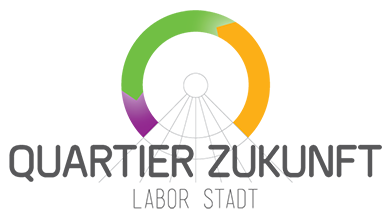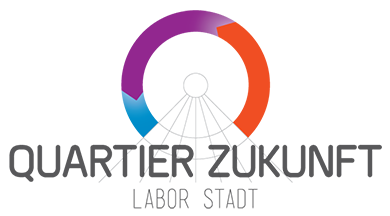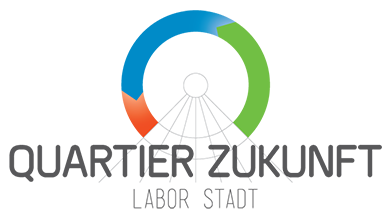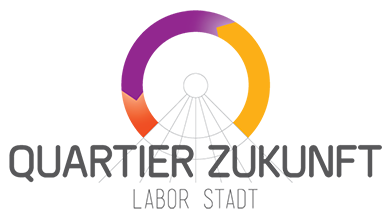Following the traces of the Urban Transition Lab 131 – Part II Mobility
Leave a CommentWe continue our blog series about the Urban Transition Lab 131. Since 2015 when the project was launched, scientists and citizens have the possibility to work together in order to develop and test measures for a (more) sustainable urban development. In the previous article we talked about the activities of the project Sustainable Consumption. This second part of the series continues with an exciting and much discussed topic of sustainability research: mobility!
An article by Vanessa Kügler & Sarah Meyer-Soylu. Translation by Sophie Dauenhauer
- Fahrradfahrer in der Stadt (Foto: Quartier Zukunft)
- Hier fahren wir gerne Rad! (Foto: Quartier Zukunft)
- Zeit mehr Rad zu fahren! (Quelle: Yannik Melchior)
Part II: Being mobile and human while moving around the Oststadt
Mobility is getting more and more important in our lifestyle. Thanks to smartphone and internet flat rate we can be contacted anytime and anywhere. For sure! We jump in the car or on the train and quickly arrive at our destination. It’s a matter of course, isn’t it? We are always on the move and always mobile – no matter if we want it or not. Our little digital helpers are an integral part of our daily routine. Man is a creature of habits – or rather a creature of laziness?
And also on our everyday stroll through the city we still tend to our routine and get annoyed about being stuck in the traffic instead of thinking about alternative means of transportation or (more) sustainable means of travel. Wouldn’t it be high time for us to be aware of our mobility behaviour and the consequences for our health and the environment? This question is related to the crucial questions of the project “Mobilitätsaspekte” (mobility aspects) within the Urban Transition Lab 131: How can I move around the city and cause as little harm to the environment as possible? How can we make mobility socially fair and human?
Being individually mobile
There are countless aspects that can be grouped under the keyword mobility. But where to start?
“Mobility in the city is too often harmful to the environment and nerve-racking. We think about a mobility concept which relies on bicycles, smart traffic management systems, and collective means of transport.”
(Goal of the key topic Mobile city)
The focus of the activities in the project “Mobility aspects” was on the area everyday mobility with its three key action points:
- Sustainable organisation of daily transporting
- Integration of bicycles and especially cargo bikes in our daily mobile routines
- Research of central traffic junctions (less traffic, more quality of stay!)
How we organise our trips and which means of transport we use is not only a product of our habits, it of course depends heavily on individual factors: e.g. physical fitness, age or the demand of transporting things like for example a pram. Additionally to these factors, our choice of the means of transportation is influenced by external factors like for example condition and routing of existing bikeways or road closures in connection with provided information about the possibilities of reaching the destination.
Organising the mobile daily life: Welcome to the travel agency for your everyday life!
How is it possible to satisfy various mobility needs of different user groups and coordinate them in a sustainable way?
- Flyer der Mobilitätsberatung des R131 (Quelle: Quartier Zukunft)
- Kommt uns im Zukunftsraum besuchen! (Foto: V.Kügler/ Quartier Zukunft)
To create a point of contact for the citizens of the Oststadt where they also can question or improve their mobility behaviour, the Urban Transition Lab 131 cooperated with the Institute for Transport (IfV). Together with this institution, that belongs to the KIT, the so-called travel agency for everyday life was established. Since the beginning of 2016, the citizens had the possibility to use the regular and free mobility consultancy, where they could get information on local mobility services and apps. This consultation should help finding more efficient and sustainable ways of travelling that nevertheless meet the individual requirements. The mobility consultancy was established in reaction to a suggestion that was made at the citizen’s forum and which was realized later than expected. Everyone involved had a lot of staying power. When the time of the opening had come at last, we unfortunately had to realize that the offer wasn’t accepted as well as we hoped. We use this experience to suit our coming project more to the citizens and their needs!
In order to make the citizens more familiar with the topic mobility and alternative means of transportation, the exposition “Von hier nach da” (from here to there) by the youth section of the environmental association BUND came to the Future Space. This touring exhibition gave the Oststadt some inspiring ideas and visions about a new mobility culture. Movie nights and presentations created a relaxing atmosphere for exchanging ideas and experiences.
You don’t always need four wheels: Come on and hop on your bike!
Car traffic – rolling or parking – dominates the quarter. This remark by the citizens was the decisive factor for an emphasis on the topic bike. In addition to that came our motivation to improve the situation for the bicycle traffic in the Oststadt and to motivate people to use their bikes more often.
- “Lastenkarle” beim Parking Day 2017 (Foto: Quartier Zukunft)
- Das R131 mobil unterwegs (Foto: Quartier Zukunft)
You don’t always need a car to transport bigger items – that’s a fact we have long been convinced of and which is why the topic carrier bicycle has been a part of our project since the beginning. Our attempts to receive funding for this topic haven’t been successful. All the more, we are pleased that people are sharing the idea throughout Karlsruhe and even established a rental system for carrier bikes: Lastenkarle. Only a stone’s throw away from the Future Space, you can find a carrier bike that can be rented by anybody!
The Urban Transition Lab 131 as well owns a carrier bike which we take with us to different events to transport heavy and bulky equipment from A to B without producing any emissions!
- Parken in der Oststadt (Foto: Quartier Zukunft)
- Parken mal anders: Park(ing) Day 2017 (Foto: Quartier Zukunft)
By taking part at the PARK(ing) Day Karlsruhe we want to draw attention to the critical relationship between car traffic and townscape- especially the enormous amount of space that is used for car parking and the question: what if we these parking areas were used in other ways?
Matching with our focus on bicycles, a student thesis on the topic daily bicycle use in the Oststadt – especially bicycle parking – was written. With the help of surveys – online and face-to-face – more than 100 citizens of the Oststadt were asked about their personal bicycle use. The questionnaire reviewed, among other things:
- How often the citizens are using their bicycles and what may be the reason for them to not using it (especially the car drivers)
- What kind of measures would be needed to make them use the bicycle more often in the future
- Where and how the citizens of the Oststadt park their bikes and what kind of problems this way of parking can cause.
You want to read more about it? No problem! You find the link to the thesis (PDF) here and at the end of the article.
- Die Hauswand als Fahrradstellplatz? (Foto: Quartier Zukunft)
- Oder die Straße? (Foto: Quartier Zukunft)
- Flyer zum Vortragsabend über Fahrradnutzung und -parken (Quelle: Yannik Melchior)
In connection with the thesis and to further sensitize for the topic bicycling and bike parking in the city, a public talk was held at the District Future regular’s table in the Oststadt. Another part of the evening was a discussion about the results of the survey and the derived recommendations for action.
Mobility as a model
How does the closing of a street or the usage of a shared space effect an urban quarter? To be able to answer such questions, the Urban Transition Lab 131-Team used an already existing traffic model of the Oststadt to make interactions of the traffic streams visible and comprehensible and to derive scenarios.
Particular attention was paid to the central traffic hub at Gottesauer Platz. In order to improve the quality of stay and to meet the citizen’s wishes regarding area design and the parking situation, redesign measures for this place were developed. In another master thesis, concrete upgrading plans for the Gottesauer Platz were worked out. Are you curious? You find the link to the thesis here and at the end of the article.
- Aktuelle Nutzung des Gottesauerplatzes (Foto: V.Kügler/ Quartier Zukunft)
- Aktuelle Nutzung des Gottesauerplatzes (Foto: V.Kügler/ Quartier Zukunft)
- Aktuell leider kein seltenes Straßenbild… (Foto: Quartier Zukunft)
By simulating the traffic, it was possible to create an up-to-date picture of the congestion. However, one challenge became increasingly clear to the scientists: the many construction sites that are present throughout Karlsruhe. With the construction of the new underground line and the related line blockades and diversions, it is effectively impossible calculating the actual traffic in the area after the completion of the construction work. This means the absence of reliable data that makes it difficult to assess interactions and prevents the enforcement of precise measures.
What comes next?
How do we proceed with the former results? At the public discussion and presentation on 27 June 2016 in the Future Space, we presented our results and received a lot of suggestions for further work. In 2018, the topic mobility will stay on our agenda! Depending on the funding, we will even give stronger emphasis on mobility and work on it together with the topics nutrition, consumption and climate protection.
We are looking for you and your ideas! You want to share your thoughts and actions on sustainability? We are happy to help implementing your project ideas. Just contact us (Sarah Meyer-Soylu is your contact partner: sarah.meyer@kit.edu) or visit us during the opening hours in the Future Space.
Curious? You can read on here (in German):
- Masterarbeit “Die Relevanz der Abstellmöglichkeiten zu Hause für den Zugang ins System ‘Fahrrad’- Eine empirische Analyse in der Karlsruher Oststadt ” / Yannik Melchior
- Präsentation “…und wo steht Ihr Fahrrad?” / Yannik Melchior
- Masterarbeit “Umgestaltungspotenziale für den Gottesauer Platz in der Karlsruher Oststadt unter Berücksichtigung verkehrlicher Aspekte” / Quzhen Deng
- Poster R131 Experimente zur Nachhaltigen Mobilität
- Poster Verkehrsmodell Oststadt (IfV)



























